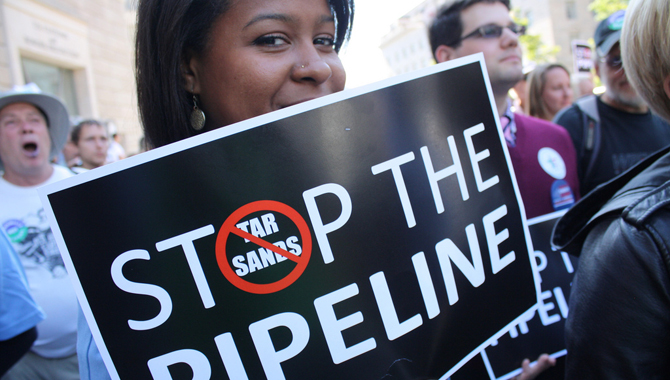
EPA: tar sands “significantly more intensive than other crudes”
The EPA slams the State Department review of Keystone XL pipeline, arguing that, from a climate perspective, “oil sands crude is significantly more GHG intensive than other crudes, and therefore has potentially large impacts.”
Canada’s Natural Resources minister, Joe Oliver, is yet again in Washington, in what it is his fourth lobbying visit in recent months.
At 9.00 AM DC time he will speak at an event hosted by the Center for Strategic and International Studies, where he will discuss “a variety of issues related to the U.S.-Canada energy relationship, including environmental stewardship in Canada, development of oil sands, and the Keystone XL pipeline proposal.”
Oliver, who has been at the forefront of the worldwide effort by the Canadians to con people about the climate impact of the tar sands, would have jumped for joy last month when the US State Department issued a draft environmental impact statement that was seen as essentially positive.
The assessment concluded that building the Keystone XL pipeline would have no significant impact on greenhouse gas emissions, because they predicted that the oil would be transported to market by rail even if the KXL was not built.
However, Oliver would have chocked on his cornflakes this week when he read a letter by Cynthia Giles, the Assistant Administrator in EPA’s Office of Enforcement and Compliance Assurance. For Giles does not agree with the State Department at all. Her letter basically argues that the State Department has fundamentally underestimated the climatic impact of KXL.
The EPA argues that, from a climate perspective, “oil sands crude is significantly more GHG intensive than other crudes, and therefore has potentially large impacts.”
The letter says that “lifecycle Greenhouse gas emissions from oil sands crude could be 81 per cent greater than the average crude refined in the U.S,” but then warned that this difference could even be greater “depending on the assumptions made”.
It warned that: “If GHG intensity of oil sands crude is not reduced, over a 50 year period the additional C02-e from oil sands crude transported by the pipeline could be as much as 935 million metric tons.”
That’s nearly one billion tonnes of carbon.
There are other lessons that the State Department need to learn too about how toxic the tar sands and diluted bitumen called dilbit are to the environment. After the 2010 Enbridge spill in Michigan, the State Department needs to “more clearly acknowledge that in the event of a spill to water, it is possible that large portions of dilbit will sink and that submerged oil significantly changes spill response and impacts.”
In total, the EPA concluded that the State Department’s review had “Insufficient Information” – a damning indictment of the original review.
I am sure that Joe Oliver will dismiss the EPA’s review, but others are arguing that it needs to be taken seriously. The Washington Post argues the review matters “a lot.”
Others agree. Jim Murphy from the National Wildlife Federation argues that the EPA’s letter “shows that despite multiple tries, the State Department is incapable of doing a proper analysis of the climate, wildlife, clean water, safety and other impacts of this disastrous and unneeded project.”
And there is more bad news for Oliver on the home front today: The Canadian press is reporting that, for the first time in 20 years, the Fort McKay First Nation is filing a formal objection against a tar sands project.
The First Nations north of Fort McMurray, which have historically worked with the oil industry, now oppose construction of a 250,000 barrel-per-day bitumen facility within their traditional land area.
The proposed Dover project, a joint venture between the Athabasca Oil Corp. and PetroChina, will be within one kilometre from a reserve where members of the band fish, and hunt. Jim Boucher, chief of the Fort McKay First Nation, said yesterday that the project “will impact the last remaining traditional land that can be used for cultural activities like hunting and trapping.”
No doubt Oliver will dismiss their concerns too.

